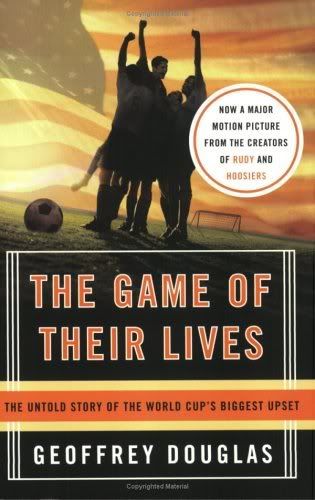
I just got done reading an awesome book. It's called "The Game Of Their Lives" and it's written by Geoffery Douglas. I highly recommend it.
The soccer match that the title refers to is arguably the biggest upset in World Cup history, the 1950 match that ended with the United States improbably defeating England. The only country in the world to refuse to take soccer seriously; the only country, to my knowledge to even call it something other than it's more appropriate name: Football. This team of regular guys (two mailmen, a sheet stacker, a hearse driver, two clerks, and a dishwasher to name a few) who mostly played for fun (only one was a professional) managed to beat the country that invented the World Cup, and one of the few highly favored teams in the world.
This book really hits home for me, because the book covers so many things that I take special interest in. I love history, particularly when it's local. I love soccer. I love the World Cup. And, I love a good story. Douglas blended all these obvious loves of his own along with a lot of research and interviews and heart to write this book.
The book covers a single soccer match, but that's hardly what the book is about. Granted, the book would have never been written had the game not been played. However, only someone who has never read the book could say that it is about a soccer match. Rather, the book is about extraordinary greatness being thrust upon a group of ordinary men and going virtually unnoticed. The book explores where these men came from, their culture, and their history.
Never before have I read a book and desired so strongly to see not just the place where the book takes place, but possibly experience just a small taste of the culture of the tight-knit community that produced these players. The author gave delightfully descriptive details of the neighborhood called "the Hill" and it's origin. It was not difficult to see with the mind's eye what it must have been like through the turn of the century there on the Hill in St. Louis. Even though today we have modern conveniences that must make that time seem like the stone age, comparatively speaking, I can't help but harbor an inner desire to abandon life as I know it and take up a life like they had. But, alas, it can't be done. That time is long gone. Some remnant of the culture, no doubt, still exists to some extent, but the complete experience cannot be obtained. It is irretrievably gone.
We can, on the other hand, read about it and enjoy what we read. I did just that with this book and maybe you will, too.
skip to main |
skip to sidebar

- Home
- Downloads
- Software
- Excel Creations
- GIMP Creations
- World Cup 2022 Printable Poster (PNG)
- World Cup 2018 Printable Poster (PDF)
- World Cup 2018 Printable Poster (PNG)
- Copa America 2016 Printable Poster (PDF)
- Copa America 2016 Printable Poster (PNG)
- Euro 2016 Printable Poster (PDF)
- Euro 2016 Printable Poster (PNG)
- World Cup 2014 Printable Poster (PDF)
- World Cup 2014 Printable Poster (JPG)
- Deck
- Sketchup Creations
- Blogs I Read
Labels
autobiography
(94)
home renovation
(64)
family
(62)
DIY
(56)
God
(45)
observation
(37)
food
(34)
opinion
(34)
truth
(34)
debate
(32)
life
(32)
automobiles
(30)
inspiration
(30)
comedy
(28)
history
(27)
controversy
(26)
politics
(24)
belief
(23)
Before & After
(22)
friends
(22)
health
(21)
Craigslist
(19)
technology
(19)
love
(18)
photography
(18)
marriage
(17)
soccer
(16)
work
(16)
art
(15)
Ford
(13)
game
(11)
movie
(11)
green
(10)
music
(10)
software
(8)
GIMP
(7)
creation
(6)
garden
(6)
9/11
(5)
Excel
(5)
book review
(5)
birthday
(3)
travel
(1)
Video
Profile

- Levi Felton
- I'm difficult to explain, but I will attempt. I am a fantastic husband, father, and employee. I have an amazing array of talents. I never stop leaving others in awe with my actions. I love my life, because my life is so great that it's virtually impossible not to love it. Finally, I also have a fair amount of self esteem. And people say that I'm often sarcastic but I don't know why.
Categories
autobiography
(94)
home renovation
(64)
family
(62)
DIY
(56)
God
(45)
observation
(37)
food
(34)
opinion
(34)
truth
(34)
debate
(32)
life
(32)
automobiles
(30)
inspiration
(30)
comedy
(28)
history
(27)
controversy
(26)
politics
(24)
belief
(23)
Before & After
(22)
friends
(22)
health
(21)
Craigslist
(19)
technology
(19)
love
(18)
photography
(18)
marriage
(17)
soccer
(16)
work
(16)
art
(15)
Ford
(13)
game
(11)
movie
(11)
green
(10)
music
(10)
software
(8)
GIMP
(7)
creation
(6)
garden
(6)
9/11
(5)
Excel
(5)
book review
(5)
birthday
(3)
travel
(1)
Design by Free WordPress Themes | Bloggerized by Lasantha - Premium Blogger Themes | Blogger Templates




0 comments:
Post a Comment